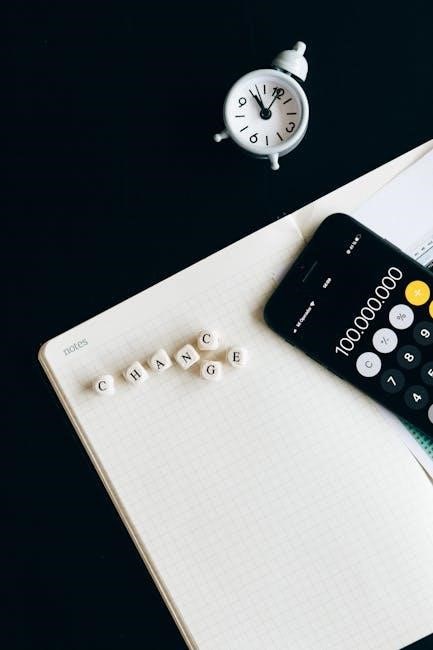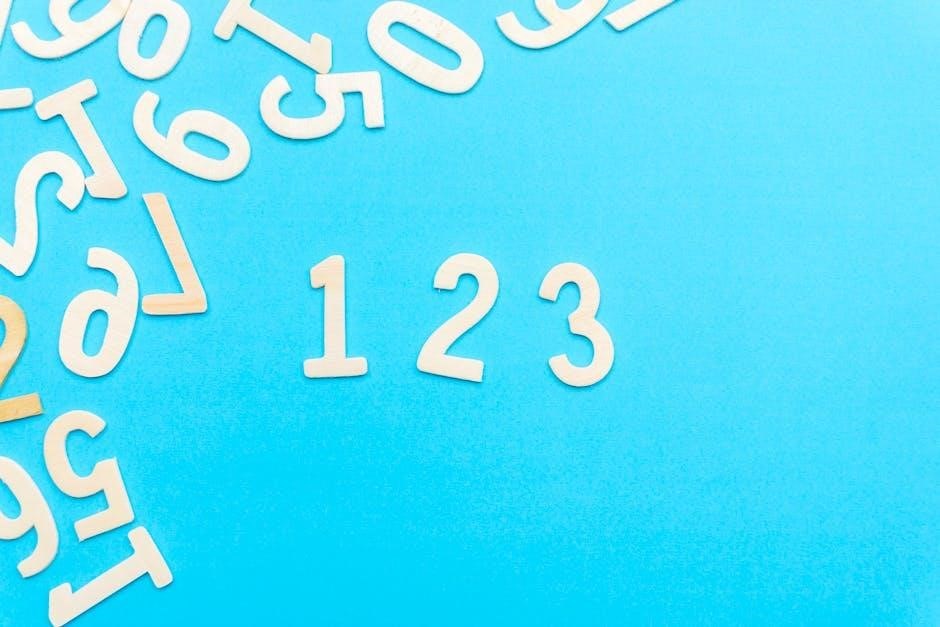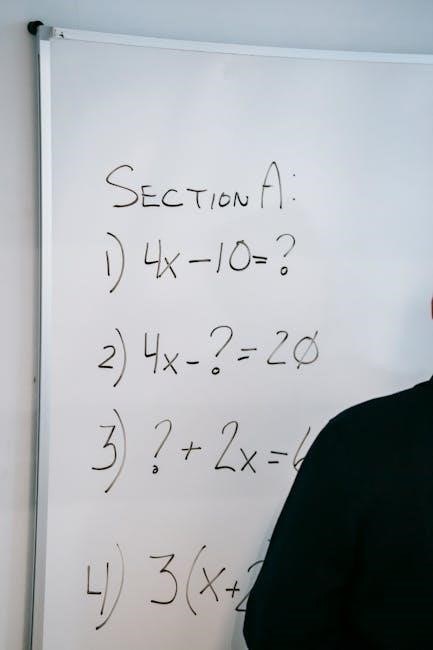Mathematical mindsets introduce students to creative math and inspiring messages, with author Jo Boaler delivering a universal blueprint for math success, using project-based approaches and daily exercises effectively always.
Overview of Jo Boaler’s Work
Jo Boaler’s work focuses on mathematics education, emphasizing the importance of creative math, inspiring messages, and innovative teaching methods. Her approach aims to reverse mathematical trauma and provide a universal blueprint for math success. Through her research and writings, Boaler delivers a comprehensive guide to unleashing students’ potential in mathematics. Her work highlights the significance of flexibility with numbers, rich mathematical tasks, and growth mindset grouping. By exploring the brain and mathematics learning, Boaler provides valuable insights into the power of mistakes and struggle in the learning process. Her writings offer a wealth of information on mathematical mindsets, including strategies for creating a supportive learning environment and promoting equity in mathematics education. With her expertise and experience, Boaler’s work has become a valuable resource for educators and students alike, providing a foundation for mathematical success and a lifelong love of learning. Her books and online resources are widely available, including a PDF version of her work.

Understanding Mathematical Trauma
Mathematical trauma affects students’ confidence and perception of math, leading to anxiety and fear, impacting their ability to learn and succeed in mathematics effectively always online.
Causes and Effects of Mathematical Trauma
Mathematical trauma is caused by various factors, including poor teaching methods, negative attitudes towards math, and high-stakes testing, leading to anxiety, fear, and decreased motivation to learn math.
According to Jo Boaler, author of Mathematical Mindsets, this trauma can have long-lasting effects on students’ academic and professional careers, making it essential to address and overcome these challenges.
The effects of mathematical trauma can be seen in students’ lack of confidence, avoidance of math-related tasks, and decreased overall performance in math classes.
By understanding the causes and effects of mathematical trauma, educators and parents can work together to create a supportive and inclusive learning environment that fosters a growth mindset and promotes math success for all students, as discussed in the book Mathematical Mindsets, which provides a comprehensive guide to reversing mathematical trauma and achieving math success.
This approach emphasizes the importance of creative math, inspiring messages, and innovative teaching methods in helping students develop a positive and resilient mindset towards math, ultimately leading to improved academic outcomes and increased confidence in math abilities, as outlined in the book and its accompanying resources.

The Importance of Mistakes in Math Learning
Mistakes in math learning support brain growth, with every error creating new synapses, leading to increased learning and understanding, as explained by Jo Boaler in her book effectively always.
How Mistakes Support Brain Growth and Learning
According to Jo Boaler, mistakes in math learning support brain growth by creating new synapses, leading to increased learning and understanding. This process is essential for cognitive development, as it allows students to reorganize and refine their thinking. The brain is challenged to learn and adapt, resulting in structural changes that enhance mathematical understanding. By embracing mistakes as an integral part of the learning process, students can develop a growth mindset, leading to increased confidence and perseverance in math. Jo Boaler’s work emphasizes the importance of mistakes in math learning, providing a framework for teachers to create a supportive and inclusive learning environment that fosters brain growth and learning. This approach has been shown to be effective in promoting math success, particularly when combined with project-based learning and daily exercises. Effective implementation of this approach can lead to improved math outcomes.

Creativity and Beauty in Mathematics
Mathematics reveals creativity and beauty, with Jo Boaler showcasing innovative teaching methods and inspiring messages to unleash students’ potential always effectively online.
Rich Mathematical Tasks for Student Engagement
Rich mathematical tasks are essential for student engagement, as they provide opportunities for students to explore and learn mathematics in a deeper and more meaningful way. According to Jo Boaler, these tasks should be open-ended, allowing students to approach them in different ways and learn from their mistakes. By using rich mathematical tasks, teachers can create a supportive and inclusive learning environment that encourages students to take risks and persist in the face of challenges. This approach can help to build students’ confidence and develop their problem-solving skills, leading to greater engagement and motivation in mathematics. Additionally, rich mathematical tasks can be used to promote equity and access in mathematics education, by providing opportunities for all students to learn and succeed, regardless of their background or prior experience. Effective implementation of these tasks requires careful planning and consideration of students’ needs and abilities.

Mathematics and Equity
Mathematics education can promote equity by providing equal access to learning opportunities and resources for all students, regardless of background or socioeconomic status always effectively.
From Tracking to Growth Mindset Grouping
Jo Boaler’s work emphasizes the importance of shifting from tracking to growth mindset grouping in mathematics education, allowing students to learn from one another and receive appropriate support. This approach encourages collaboration and mutual respect among students, fostering a sense of community and promoting deeper understanding of mathematical concepts. By abandoning traditional tracking methods, educators can create a more inclusive and equitable learning environment, where students are empowered to take risks and embrace challenges. According to Boaler, this shift in approach can have a profound impact on students’ mathematical development, leading to increased confidence, improved problem-solving skills, and a more positive attitude towards mathematics. As a result, students are better equipped to succeed in an increasingly complex and interconnected world, where mathematical literacy is essential for navigating everyday life and making informed decisions. Effective implementation of growth mindset grouping requires careful planning and ongoing support from educators.
Assessment for Growth Mindset
Jo Boaler’s assessment strategies focus on promoting growth mindset, using daily exercises and feedback to support student learning and development effectively always with new approaches and methods.
Short Daily Exercises for Structural Brain Changes
Jo Boaler’s research emphasizes the importance of short daily exercises in promoting structural brain changes, leading to improved math learning and retention. These exercises, when done consistently, can lead to significant gains in math understanding and proficiency. The brain, being a highly adaptable organ, responds well to regular challenges and exercises, forming new connections and strengthening existing ones. By incorporating short daily exercises into their math routine, students can develop a growth mindset, becoming more confident and proficient in their math abilities. This approach, as outlined in Mathematical Mindsets, has been shown to be effective in reducing math anxiety and improving overall math performance, making it an essential component of any math education program. With regular practice, students can develop a deeper understanding of mathematical concepts and improve their problem-solving skills, leading to greater success in math and other areas of their lives.
and Recommendations
Jo Boaler’s Mathematical Mindsets provides valuable recommendations for educators to implement effective math teaching methods and strategies always successfully online.
Accessing Mathematical Mindsets Resources
Jo Boaler’s Mathematical Mindsets resources are readily available online, including a downloadable PDF version of her book, which can be accessed through various online platforms and websites. The book provides a comprehensive guide to implementing mathematical mindsets in the classroom, with practical strategies and techniques for teachers to use. Additionally, there are many online resources and tools available to support the implementation of mathematical mindsets, including video tutorials, lesson plans, and interactive activities. These resources can be used to support teacher professional development and to provide students with engaging and challenging math lessons. By accessing these resources, educators can gain a deeper understanding of mathematical mindsets and how to apply them in their teaching practice, ultimately leading to improved student outcomes and a more positive attitude towards math. This can be achieved through online searches and downloads.
